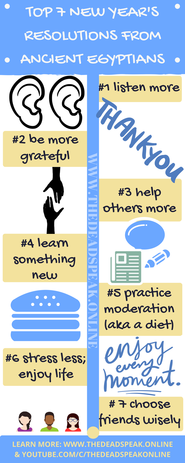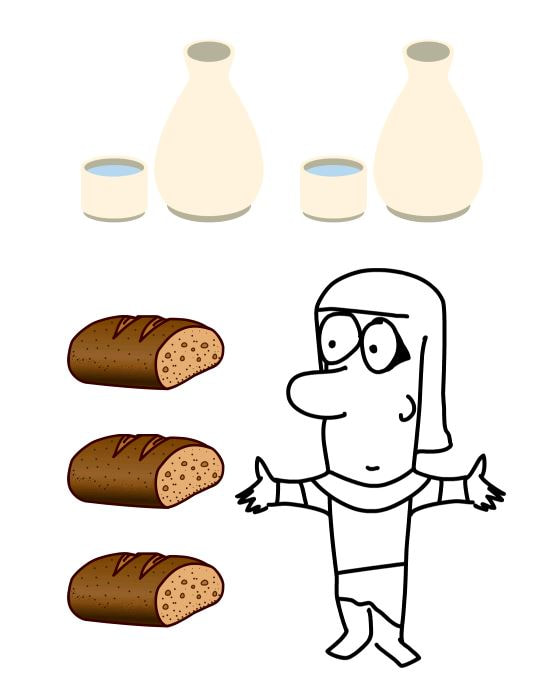|
WE'VE MOVED TO:
VOICESOFANCIENTEGYPT.COM |
|
Note: this post may contain affiliate links, which means that I receive a small commission when you make a purchase through one of these links. I only recommend books that I have read myself and know to be of good quality. These small commissions help support this blog and YouTube channel and allow me to continue to make videos and write posts like this one. Thank you for your support!
Rather watch than read? Check out our video version of this post. Resolution Idea #1: Listen moreFirst on the list is to listen more! Ancient Egyptian wisdom literature and autobiographies are full of advice on keeping quiet and listening to others at appropriate times. For example, in the Maxims of Ptahhotep, Ptahhotep advises his son:  “If you are a man who leads, Listen calmly to the speech of one who pleads; Don’t stop him from purging his body Of that which he planned to tell. A man in distress wants to pour out his heart More than that his case be won... Not all one pleads for can be granted, But a good hearing soothes the heart.”[1] In other words, Ptahhotep is saying that you should hear out a person who is upset. Whether you disagree with the person, can or can’t help them, you should hear what the person has to say because it will make him feel better. Interrupting him will benefit no one. This is not just good advice for ancient Egyptians, but for everyone who wants to make a greater connection with the people in their lives or who want to start new relationships. Whether a person is upset or she has good news, nothing will make her feel better than you giving her your full attention and truly listening to what she has to say. Resolution Idea #2: Be More Grateful (Not Greedy)The second resolution is to be more grateful for what you have and to not be greedy. This is another one that shows up in wisdom literature, particularly in the Maxims of Ptahhotep. At the beginning of his instructions, Ptahhotep advises:
In other words, greed is not only something to be avoided for moral reasons, but also because it tears apart families and makes people hateful. Instead, we should appreciate what we have and, as Ptahhotep says, follow our hearts. Resolution Idea #3: Do More to Help OthersThe third resolution is to do more to help others. Many ancient Egyptian texts, including biographies and wisdom texts emphasize helping those less fortunate, whether through giving or through protecting them from harm. For example, the biography of a Third Intermediate Period priest and official named Nebneteru advises readers to enjoy life and warns them to not be greedy and stingy: “Do not be tightfisted with what you own, Do not act empty-handed with your wealth!”[4] The Instruction of Ankhsheshonq puts it more poetically: “Sweeter the water of him who has given it than the wine of him who has received it.”[5] Being more giving and charitable is among the most common ancient Egyptian advice and also the most common behavior that ancient officials claimed to have done. The benefits of giving are many, but as Ankhsheshonq points out, it’s even sweeter for the giver than the receiver. Resolution Idea #4: Learn Something New This YearFourth is to learn something new or otherwise educate yourself. Egyptian wisdom texts often advise the reader to read more and study harder. The Middle Kingdom wisdom text called the Instruction for King Merikare counsels: Here at The Dead Speak Online, we would tend to agree - we do love books (and videos!) - and we include a list of recommended books with every blog post and video. We would also encourage you to read our blog and watch our videos as part of learning something new this year, but we're biased! Resolution Idea #5: Practice Moderation in Eating and DrinkingThe fifth ancient Egyptian resolution is one of the most common resolutions among modern Americans: practice moderation in eating and drinking - otherwise known as going on a diet!
In other words, not only should you restrain yourself because its good social behavior and good for your character (in the ancient Egyptian viewpoint), but you should also take care of your body while you are still well because you never know what’s coming down the line for your health or how long you will live. Better to face whatever might happen from a healthier starting point. Resolution Idea #6: Stress Less; Enjoy LifeThe sixth resolution is one that is perhaps not in the top ten of modern resolutions, but is one that is definitely needed in our modern, western society: stress less about money and enjoy life more. Ptahhotep already alluded to this pursuit when he advised not to accumulate more wealth than you need because it won’t help you if you’re not happy. On the other end of ancient Egyptian history, the High Priest of the god Thoth at the very end of the Late Period named Sishu recommends enjoying life because wealth cannot prevent death from coming at any time: You probably noticed that this is somewhat contradictory to resolution #5 and its associated quotes! The ancient Egyptians were not always consistent, just like modern people of the same culture do not always have the same values. However, one can potentially adhere to both by taking care of the body on a regular basis, but also “letting your hair down,” so to speak, for special occasions, like festivals. After all, spending time with friends and family and having a good time are also important for your health. Resolution Idea #7: Spend Time Wisely and with the Right PeopleOur final resolution is to be more selective about how you spend your time and who you spend it with. Surround yourself with people who are the way you strive to be. Ankhsheshonq makes this clear: This is actually pretty common advice in modern self-improvement circles because science has shown that we tend to take on the actions and emotions of those around us. So, for example, if you hang around negative people, you will be more negative yourself. This is a phenomenon called social contagion. Whether you want to get ahead in your career or simply live a happier life, you should take a look at the people around you and perhaps re-prioritize how you spend your time and with whom. Question: Now I have a question for you: what is your New Year’s resolution? If you don’t have one yet, what resolutions are you considering? Let me know in the comments below, and be sure to check out other people’s comments for some extra inspiration! Thanks for reading and see you next time! Recommended reading: The following two books/series are classics used by students of Egyptology and Egyptologists. They both offer a variety of texts from ancient Egypt – everything from autobiographies and wisdom literature to love poetry and hymns - translated into English. Lichtheim, Ancient Egyptian Literature: A Book of Readings (in 3 volumes): Vol. I: The Old and Middle Kingdoms Vol. II: The New Kingdom Vol. III:The Late Period Simpson, Ritner, Tobin, and Wente, The Literature of Ancient Egypt: An Anthology of Stories, Instructions, Stelae, Autobiographies, and Poetry; Third Edition. References for quoted texts: [1] Maxims of Ptahhotep, Maxim 17: Lichtheim, Ancient Egyptian Literature I, p. 68. [2] Maxims of Ptahhotep, Maxim 11: Lichtheim, Ancient Egyptian Literature I, p. 66. [3] Maxims of Ptahhotep, Maxim 19: Lichtheim, Ancient Egyptian Literature I, p. 68-9. [4] Statue inscription of Nebnteru: Lichtheim, Ancient Egyptian Literature III, p. 22. [5] Instruction of Ankhsheshonq, Lichtheim, Ancient Egyptian Literature III, p. 174. [6] The Instruction Addressed to King Merikare: Lichtheim, Ancient Egyptian Literature I, p. 99 [7] The Satire of the Trades: Lichtheim, Ancient Egyptian Literature I, p. 185. [8] The Satire of the Trades: Lichtheim, Ancient Egyptian Literature I, p. 191. [9] Instruction of Ankhsheshonq, Lichtheim, Ancient Egyptian Literature III, p. 166. [10] Speech of Sishu, father of Petosiris: Lichtheim, Ancient Egyptian Literature III, p. 51. [11] Instruction of Ankhsheshonq, Lichtheim, Ancient Egyptian Literature III, p. 164. [12] Instruction of Ankhsheshonq, Lichtheim, Ancient Egyptian Literature III, p. 169. Image credits: Man yelling, heart book pages, jug/cup, bread loaf, and fool images are licensed under CC0 Creative Commons.
All other images were created by theDeadSpeak.Online using VideoScribe.
0 Comments
|










 RSS Feed
RSS Feed